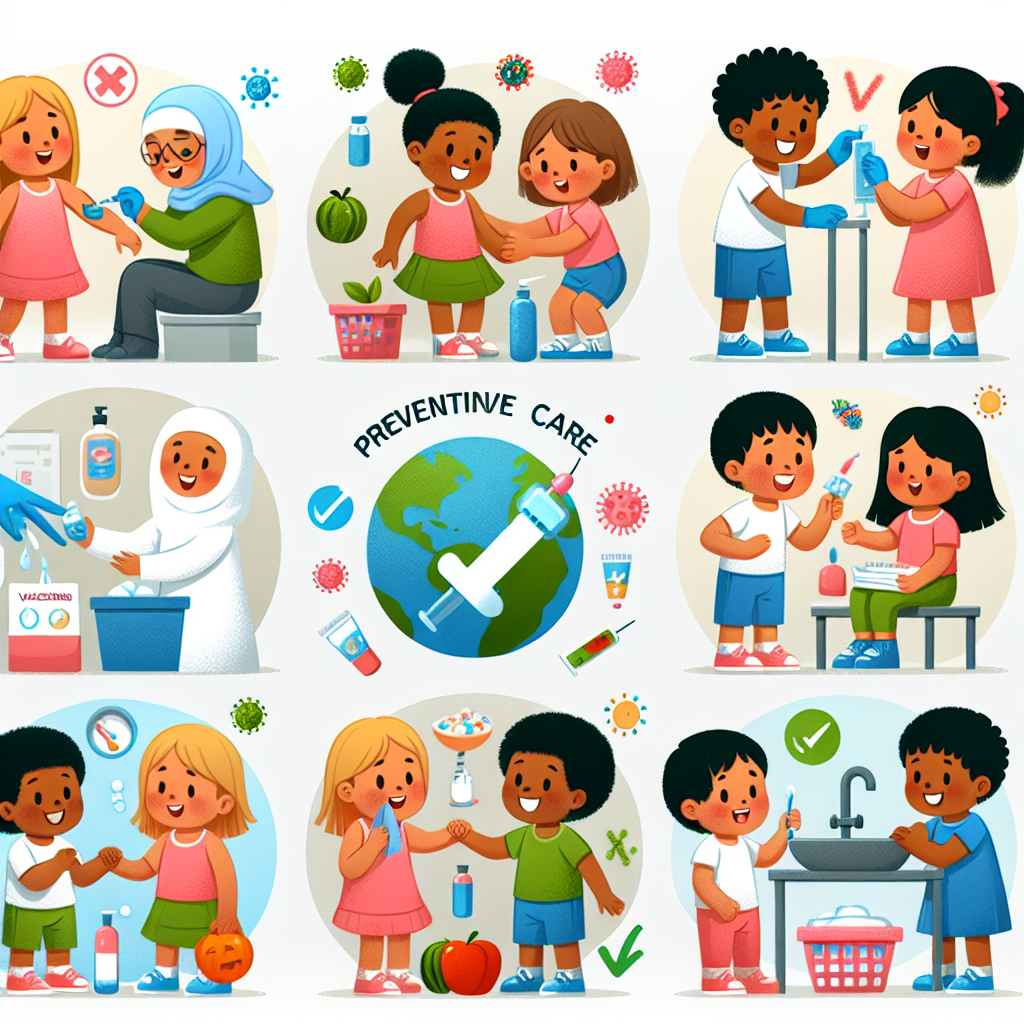Nurturing Your Child’s Well-being from Infancy to Adolescence
Résumé
This article provides a thorough guide on child health, covering nutrition, exercise, mental health, vaccinations, and common illnesses, offering parents actionable advice to ensure their child’s healthy development.
Plan de l’article
- 1. Nutrition for Growing Kids
- 2. Physical Activity and Exercise
- 3. Mental Health and Emotional Well-being
- 4. Vaccinations and Preventive Care
- 5. Managing Common Childhood Illnesses

Nutrition for Growing Kids
Balanced Diets for Different Ages
Understanding the nutritional needs of children at various stages of growth is crucial for their development. For infants, breast milk or formula provides all the nutrients needed for the first six months. As they transition to solid foods, introducing a variety of fruits, vegetables, and grains can help establish healthy eating habits early on. The primary keyword, child health, is inherently tied to the quality of nutrition provided at this stage, laying the foundation for future health.
As children grow into toddlers and preschoolers, their dietary needs shift. They require increased amounts of protein, iron, and calcium to support rapid growth and development. Incorporating dairy products, lean meats, and fortified cereals can meet these needs while also keeping child health at the forefront. It’s essential to encourage a balanced diet that includes all food groups to ensure they receive a broad spectrum of nutrients necessary for their development.
For school-aged children and adolescents, maintaining a balanced diet becomes even more important as they face new challenges like peer pressure and busy schedules. Ensuring they consume adequate fruits, vegetables, whole grains, and proteins supports not only physical growth but also mental health. Educating them about the importance of nutrition for child health can empower them to make healthier food choices as they move towards independence.
Importance of Vitamins and Minerals
Vitamins and minerals are vital for the healthy development of a child. They play essential roles in bone growth, immune function, and cognitive development. For instance, vitamin D aids in calcium absorption, crucial for strong bones, while iron is necessary for transporting oxygen in the blood, supporting energy levels and brain function. Ensuring your child receives an adequate supply of these nutrients can set the foundation for lifelong health.
A balanced diet rich in fruits, vegetables, whole grains, and lean proteins can provide the necessary vitamins and minerals. However, deficiencies can occur, especially in picky eaters or during periods of rapid growth. In such cases, supplements might be considered, but it’s important to consult with a pediatrician first. Key nutrients like calcium, vitamin C, and zinc should be monitored, as they are crucial for growth, healing, and immune function.
Incorporating a variety of foods into your child’s diet can make it easier to meet their nutritional needs. Foods such as leafy greens, dairy products, and fortified cereals are excellent sources of essential nutrients. Educating children about the importance of these nutrients can also encourage them to make healthier food choices. Remember, child health care isn’t just about what’s on the plate but also about creating a positive relationship with food.
Dealing with Picky Eaters
Navigating the challenge of a picky eater can be daunting, but understanding the root of this behavior is key to promoting healthier eating habits. Often, children’s reluctance to try new foods stems from a natural wariness of unknown substances, a trait that’s deeply ingrained in our survival instincts. Parents can address this by gradually introducing new foods alongside familiar favorites, thus making the unfamiliar less intimidating. Incorporating the essential tips for child health into daily meals can help in ensuring your child gets the nutrition they need for growth.
One effective strategy in dealing with picky eaters is to involve them in the meal preparation process. By allowing children to participate in choosing, washing, or even cooking simple dishes, they develop a sense of ownership over their food. This not only increases the likelihood that they will try what they’ve helped to create but also educates them about nutrition, aligning with our comprehensive guide on child health. Moreover, setting a positive example by enjoying a variety of healthy foods yourself can encourage them to follow suit.
Consistency is crucial when trying to expand a child’s palate. It’s important not to force them to eat but to offer a variety of nutritious options at every meal. Patience plays a significant role here; research shows it might take up to 15 exposures to a new food before a child accepts it. By maintaining a calm and persistent approach, parents can guide their children towards better eating habits, supporting their overall health and development as outlined in our guide on essential tips for child health.
Voir notre article: https://baby-journal.com/valise-de-maternite-le-guide-complet-pour-une-preparation-sans-stress/

Physical Activity and Exercise
Age-Appropriate Activities
Engaging children in age-appropriate physical activities is crucial for their overall development and health. For infants, activities like tummy time are essential to strengthen neck and shoulder muscles, setting the foundation for future motor skills. As children grow into toddlers, simple games like chase or dancing to music can significantly enhance their coordination and balance. Incorporating these activities into daily routines helps foster a lifelong love for exercise, aligning with essential tips for child health.
As children enter the preschool stage, activities that promote both physical and cognitive development become increasingly important. Structured activities such as swimming lessons or t-ball can not only improve physical fitness but also teach teamwork and discipline. Unstructured play, like climbing on playground equipment or running in open spaces, allows for the development of creativity and problem-solving skills. These varied activities are vital components of comprehensive child health care, ensuring well-rounded growth.
For school-aged children, sports and more organized physical activities become central to their routine. Participation in team sports like soccer or basketball can enhance physical fitness while also teaching children valuable life skills such as cooperation and resilience. Individual sports, such as gymnastics or martial arts, offer opportunities for personal achievement and self-discipline. Ensuring that children are engaged in these activities not only supports their physical health but also contributes to their mental wellness, a key aspect of nurturing your child’s growth at every stage.
Benefits of Sports and Play
Engaging in sports and play is not just fun for children; it’s a vital component of their physical development. Regular participation in sports helps children build a strong foundation of fitness, which is essential for healthy growth. From improving cardiovascular health to enhancing muscle strength and endurance, the benefits of physical activity through sports are immense. Sports like soccer, basketball, and swimming not only keep children active but also teach them valuable life skills such as teamwork, discipline, and perseverance, which are crucial for their overall development.
Moreover, the joy of play and sports can significantly contribute to a child’s mental well-being. When children engage in physical activities, they release endorphins, which help reduce stress and improve mood. This aspect of sports is particularly important in today’s digital age, where screen time often competes with physical activity. Encouraging children to play sports can help combat issues like anxiety and depression, fostering a happier, more resilient young mind. It’s not just about the physical health benefits; sports and play nurture a child’s mental health too.
Incorporating sports and play into a child’s routine also supports cognitive development. Activities that require strategy and coordination, such as chess or team sports, can enhance brain function, improving memory, attention, and problem-solving skills. These cognitive benefits are essential for academic success and lifelong learning. By making sports and play a regular part of a child’s life, parents can ensure they are nurturing not only a healthy body but also a sharp and agile mind, laying the groundwork for a well-rounded future.
Encouraging an Active Lifestyle
Encouraging an active lifestyle in children is crucial for their overall health and development. Regular physical activity not only helps in maintaining a healthy weight but also boosts cardiovascular health, strengthens muscles and bones, and enhances mood and cognitive functions. Parents can start by setting a positive example through their own active behaviors, which can significantly influence a child’s attitude towards exercise.
To make physical activity enjoyable, consider integrating it into daily routines in fun and creative ways. For instance, turning a walk to the park into a scavenger hunt or organizing family sports days can keep children motivated. Additionally, allowing children to choose activities they enjoy, whether it’s dancing, swimming, or playing a sport, can foster a lifelong love for being active. It’s important to vary the activities to keep the excitement alive and prevent boredom.
Schools and communities play a vital role in promoting an active lifestyle among children. Programs like after-school sports, physical education classes, and community sports leagues provide structured opportunities for kids to stay active. Parents should also be aware of screen time limits, encouraging outdoor play over sedentary activities. By creating an environment that values physical activity, we can help children develop healthy habits that will benefit their child health throughout their lives.
Voir notre article: https://baby-journal.com/podcasts-maman-papa/
Source: https://allbritesmiles.com/the-ultimate-guide-to-your-childs-dental-health-tips-for-healthy-smiles/

Mental Health and Emotional Well-being
Understanding Child Psychology
Understanding child psychology is crucial for nurturing a child’s mental health and emotional well-being. Child psychology explores how children develop emotionally, cognitively, and socially from infancy through adolescence. By understanding these developmental stages, parents can better support their child’s growth, helping them navigate the complexities of growing up. Key aspects include recognizing emotional cues, understanding behavioral patterns, and fostering an environment that encourages healthy emotional expression.
One fundamental concept in child psychology is the importance of attachment. Secure attachment, formed through consistent and responsive caregiving, lays the foundation for emotional stability and resilience. Children with secure attachments tend to explore their world confidently, knowing they have a safe base to return to. This attachment influences how children interact with others, their self-esteem, and their ability to manage stress and emotions, which are all essential components of child health care.
Another critical area within child psychology is the development of self-regulation and emotional intelligence. As children grow, they learn to manage their emotions, control impulses, and develop empathy towards others. Parents play a vital role in this process by modeling appropriate emotional responses and providing guidance on how to handle feelings. This development is integral to a child’s mental health, enabling them to form healthy relationships and cope with life’s challenges effectively.
Signs of Emotional Distress
Understanding the signs of emotional distress in children is crucial for their mental health. Parents should look for changes in behavior, such as increased irritability or withdrawal from social activities. These shifts can be subtle, but they are important indicators that a child might be struggling emotionally. By recognizing these signs early, parents can take steps to support their child’s emotional well-being, which is an integral part of ensuring their child’s overall health.
Another key sign of emotional distress in children is a noticeable change in their sleep patterns. Insomnia or excessive sleeping can both be responses to emotional turmoil. If a child who previously had a regular sleep schedule starts experiencing difficulties falling asleep or staying asleep, it might be a signal that they are dealing with stress or anxiety. Addressing these sleep issues promptly can help mitigate further emotional distress and support the child’s mental health.
Changes in appetite can also signal emotional distress in children. A child might suddenly lose interest in food or, conversely, start eating more than usual. These changes can be linked to stress, sadness, or other emotional issues. Monitoring these shifts in eating habits and discussing them with a healthcare provider can help in understanding and addressing the underlying emotional concerns, thereby promoting better mental health and emotional well-being in children.
Strategies for Emotional Support
Supporting your child’s emotional health is crucial for their overall well-being. One effective strategy is to foster open communication, allowing children to express their feelings freely. Encourage them to talk about their day, their fears, and their joys. This not only helps them feel heard but also strengthens your bond, which is essential for child health. By validating their emotions, you help build their emotional intelligence, crucial for their mental health journey.
Another important approach is to teach children coping mechanisms for managing stress and anxiety. Techniques like deep breathing, mindfulness, or even engaging in regular physical activity can be beneficial. These practices can enhance a child’s ability to handle life’s challenges, directly impacting their child health positively. Introducing these methods early can lay a strong foundation for mental resilience throughout their development.
Creating a supportive environment also plays a significant role in child health. Ensure that the home is a safe space where mistakes are seen as opportunities for learning, not for punishment. Encourage a positive atmosphere by celebrating small victories and providing comfort during setbacks. By doing so, you contribute to your child’s emotional security and overall mental health, which are integral parts of nurturing their growth at every stage.
Voir notre article: https://baby-journal.com/concept/
Source: https://www.omegapediatrics.com/preventing-accidents-for-children-tips/

Vaccinations and Preventive Care
Recommended Vaccination Schedule
Ensuring your child follows the recommended vaccination schedule is pivotal for their health and well-being. Vaccinations protect against a range of preventable diseases, from measles to polio, safeguarding not only your child but also the community through herd immunity. The Centers for Disease Control and Prevention (CDC) recommends a series of vaccinations starting from birth, with key immunizations administered at 2, 4, 6, 12, and 18 months, and continuing through adolescence.
A typical vaccination schedule includes the Hepatitis B vaccine given at birth, followed by the DTaP vaccine for diphtheria, tetanus, and pertussis at 2, 4, and 6 months. Between 12 to 15 months, your child should receive the MMR vaccine for measles, mumps, and rubella, and the Varicella vaccine for chickenpox. By ensuring these vaccinations are up-to-date, parents contribute significantly to their child’s health care strategy, protecting against illnesses that can severely impact child health.
It’s essential to keep a vaccination record and consult with your pediatrician to stay on schedule. The schedule may vary slightly based on public health guidelines and any unique health conditions your child might have. Additionally, catch-up vaccinations are available for children who may have missed doses. By adhering to the recommended vaccination schedule, you’re taking a proactive step towards nurturing your child’s growth and maintaining their overall health throughout their developmental stages.
Importance of Regular Check-ups
Regular check-ups are a cornerstone of child health care, providing an opportunity for doctors to monitor your child’s growth and development closely. During these visits, pediatricians can assess if your child is reaching key developmental milestones, such as walking or speaking, on time. These appointments are also crucial for early detection of any potential health issues, allowing for timely interventions that can significantly impact your child’s long-term health and well-being. Ensuring your child attends regular check-ups is a proactive step in nurturing their overall health.
Beyond physical health, regular check-ups play a vital role in maintaining your child’s mental and emotional wellness. Pediatricians can screen for developmental or behavioral concerns and offer guidance on nurturing a supportive environment at home. These visits provide a platform for parents to discuss any worries or observations, ensuring that mental health is not overlooked. Integrating mental health into routine check-ups underscores the holistic approach necessary for comprehensive child health care.
Vaccinations, often administered during regular check-ups, are a critical aspect of preventive care. These appointments ensure that your child’s immunization schedule is up-to-date, protecting them against a range of preventable diseases. Additionally, regular check-ups allow for discussions about the importance of vaccinations, addressing any concerns or myths parents might have. By committing to regular check-ups, you not only safeguard your child’s health but also contribute to community immunity, which is essential for public health.
Common Health Screenings
Regular health screenings are an integral part of preventive child health care. These screenings help in the early detection of potential health issues that could impact a child’s development. Common screenings include vision and hearing tests, which are crucial for assessing a child’s sensory development. By identifying problems such as vision impairment or hearing loss early, parents can seek timely interventions, ensuring their child’s growth remains on track. These screenings are typically scheduled at various developmental milestones, aligning with the comprehensive approach to child health care as outlined in this guide.
Growth monitoring is another essential health screening that plays a pivotal role in child health. Through regular measurements of height, weight, and BMI, healthcare providers can track a child’s growth patterns. This data is plotted against growth charts to assess whether a child is growing at a normal rate or if there are deviations that require further investigation. Nutritional guidance can then be tailored based on these findings, supporting the overall goal of nurturing a child’s healthy development, as emphasized in this essential guide to child health.
Blood tests are also a common health screening for children, used to check for conditions like anemia, lead levels, and cholesterol. These tests provide insights into a child’s overall health status and can help prevent or manage diseases before they become serious. For instance, early detection of anemia can lead to dietary adjustments or supplements to address iron deficiency, aligning with the nutritional focus of this guide. Regular health screenings, including blood tests, are key components of a proactive approach to child health care, ensuring comprehensive care and attention to every aspect of a child’s well-being.
Voir notre article: https://baby-journal.com/idees-de-repas-bebe/
Source: https://carsonmedicalgroup.com/blog/

Managing Common Childhood Illnesses
Recognizing Symptoms Early
One of the cornerstones of child health care is the early recognition of symptoms, which can significantly impact the outcome of common childhood illnesses. Parents should be vigilant in observing their child for signs such as fever, lethargy, or changes in appetite, which might indicate the onset of an illness. For instance, a persistent cough or difficulty breathing can be early indicators of respiratory issues, while a sudden change in mood or behavior might signal a psychological disturbance. By staying attentive to these symptoms, parents can seek timely medical advice, enhancing their child’s recovery.
Regularly checking for symptoms like rashes, ear pain, or gastrointestinal issues can help in the early detection of common childhood diseases. A rash could be a sign of an allergic reaction, a viral infection like chickenpox, or even a more serious condition such as meningitis. Ear pain might suggest an ear infection, a frequent ailment in young children. Furthermore, symptoms like vomiting or diarrhea are often linked to stomach bugs. Understanding these symptoms not only aids in quick intervention but also in preventing the spread of infections to other family members or peers in child care settings.
It’s crucial to teach children about expressing how they feel, as their verbal cues can be invaluable in recognizing early symptoms. If a child mentions a sore throat or headache, it might be the beginning of a cold or flu. Similarly, complaints about stomach aches could be indicative of food intolerances or infections. Encouraging open communication about their health can empower children to take an active role in their own child health care, ensuring that parents can respond promptly to any emerging health concerns.
Home Care vs. Medical Attention
When dealing with common childhood illnesses, knowing when to opt for home care versus seeking medical attention is crucial for your child’s health. For minor ailments like a common cold or mild fever, home care can be effective. Ensure your child stays hydrated, rests well, and consider over-the-counter remedies like saline nasal drops or fever reducers as advised by a pediatrician. These steps can significantly alleviate symptoms and promote recovery at home, reflecting the essential tips for child health we’re discussing.
However, certain symptoms demand immediate medical attention to safeguard your child’s well-being. High fever, severe pain, difficulty breathing, persistent vomiting, or any signs of dehydration are red flags that require a doctor’s visit. Quick intervention can prevent complications and ensure your child gets back on the path to healthy development. Understanding these signs is a key aspect of nurturing your child’s growth, as emphasized throughout our comprehensive guide on child health.
Balancing home care with the need for medical attention is part of comprehensive child health care. Always keep a close watch on your child’s condition. If symptoms worsen or do not improve within a few days, it’s wise to consult a healthcare professional. Remember, while home remedies can be comforting, nothing replaces the expertise of a medical practitioner when it comes to ensuring your child’s health and safety. This balance is essential in managing your child’s health effectively.
Prevention Strategies
Preventing common childhood illnesses starts with fostering good hygiene practices at home. Regular handwashing is a simple yet effective strategy to reduce the spread of germs. Encourage your child to wash their hands before meals, after using the bathroom, and after playing outdoors. Alongside hygiene, maintaining a clean living environment can significantly lower the risk of infections. Regularly disinfecting surfaces and toys can help keep illnesses at bay, ensuring your child’s health care is proactive rather than reactive.
Nutrition plays a crucial role in bolstering a child’s immune system, an essential aspect of child health care. A balanced diet rich in vitamins and minerals can fortify their body’s defenses against common illnesses. Include a variety of fruits, vegetables, whole grains, and proteins in their meals. Foods high in vitamin C, like oranges and strawberries, and vitamin D, such as salmon and fortified milk, are particularly beneficial. By nurturing their growth with nutritious foods, you’re equipping them to better resist infections.
Vaccinations are a cornerstone of child health care and a vital prevention strategy against serious diseases. Keeping up with the recommended vaccination schedule can protect your child from illnesses such as measles, mumps, and polio. It’s important to consult with your pediatrician to ensure your child receives all necessary vaccinations on time. Beyond vaccinations, promoting a healthy lifestyle that includes regular exercise can enhance your child’s overall health, reducing their susceptibility to common ailments.
Voir notre article: https://baby-journal.com/idees-dactivites-ludiques/
Source: https://kidshealth.org/en/parents/guide-parents.html



